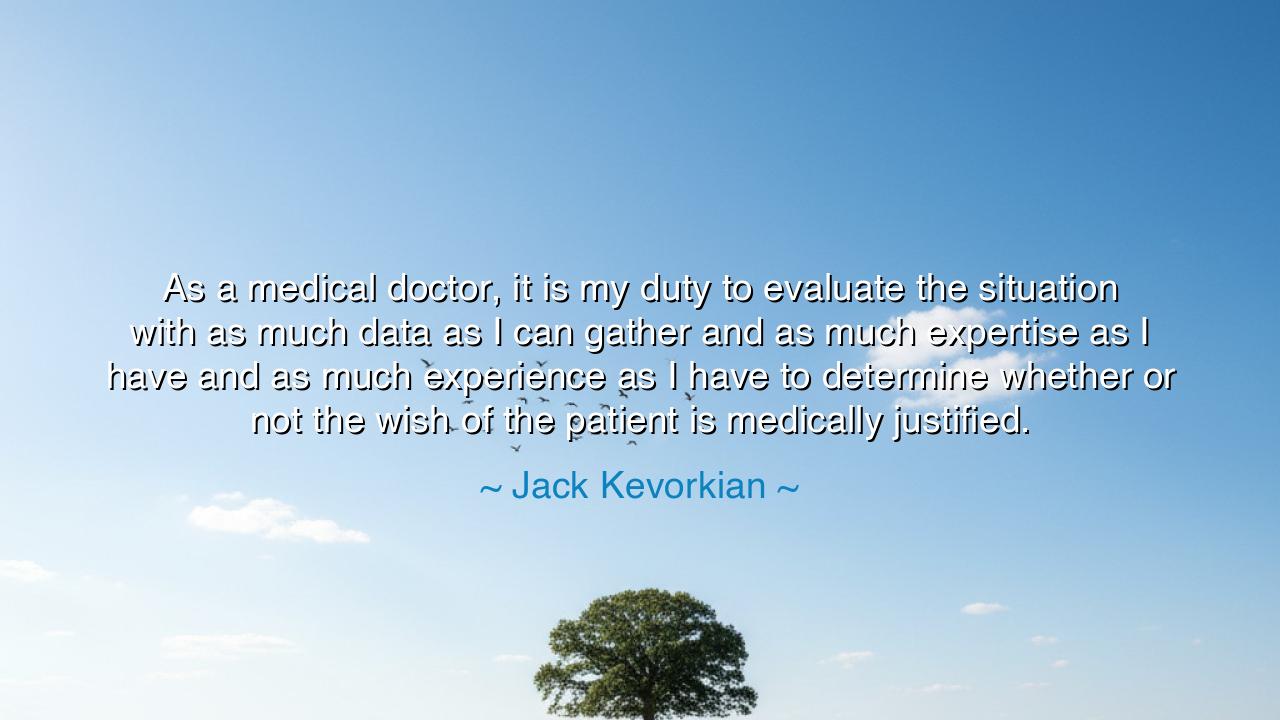
As a medical doctor, it is my duty to evaluate the situation with
As a medical doctor, it is my duty to evaluate the situation with as much data as I can gather and as much expertise as I have and as much experience as I have to determine whether or not the wish of the patient is medically justified.






Hear the solemn words of Jack Kevorkian, who bore both the praise and condemnation of his age: “As a medical doctor, it is my duty to evaluate the situation with as much data as I can gather and as much expertise as I have and as much experience as I have to determine whether or not the wish of the patient is medically justified.” These are not idle words, but the voice of one who stood at the threshold where life and death meet, where duty and compassion wrestle with law and tradition. In them we find the weight of the physician’s burden: to act not with haste or impulse, but with the fullness of knowledge, wisdom, and conscience.
The doctor, throughout history, has been entrusted not only with the power to heal but with the sacred responsibility to discern. Kevorkian’s words reveal that the physician is not a servant of desire alone, nor merely a mechanic of the body. Instead, he is a guardian of judgment, weighing the cries of the patient against the standards of medicine, balancing mercy with knowledge. It is an echo of the Hippocratic Oath, where the healer pledges to act for the benefit of the sick, and never to harm—even when the definition of harm itself becomes contested.
The origin of Kevorkian’s statement lies in his controversial role as an advocate of physician-assisted death. To some, he was a monster who violated the sanctity of life; to others, he was a liberator, granting relief to those bound in unending suffering. His words remind us that his actions were not born of recklessness, but of deep deliberation. He claimed no right to act without data, expertise, and experience; he bore the solemn conviction that his decisions must be grounded in medicine, not whim. Thus his quote is not merely about ending life—it is about the duty of the physician to weigh all matters with utmost seriousness before any act is done.
History holds other examples of such grave discernment. Consider the Roman physician Galen, whose knowledge of anatomy and healing influenced centuries of medicine. In times of plague, Galen too was asked impossible questions: whom to treat, whom to abandon, what remedies to attempt when hope was faint. His choices, like Kevorkian’s, demanded not only skill but courage. For the physician’s burden is not merely technical; it is moral, always entangled with the dignity of the human soul.
Kevorkian’s words also highlight the tension between the wish of the patient and the authority of medical judgment. Love and respect demand that we listen to those who suffer, yet wisdom demands that we do not act blindly on their wishes. The role of the physician, then, is not to command nor to submit, but to evaluate—to discern when a request is grounded in true necessity and when it arises from despair or misunderstanding. In this balance lies the doctor’s true nobility: to uphold both science and compassion in the face of suffering.
The lesson for us is clear: in all matters of grave consequence, whether of life, justice, or choice, let us gather all that we can—data, expertise, and experience—before we act. Do not let haste or passion rule decisions that cannot be undone. Seek knowledge, weigh it with wisdom, and temper both with compassion. This is not only the duty of doctors, but the duty of all who bear responsibility for others.
And so, let your actions follow. When you are faced with the plea of another—whether in your family, your community, or your nation—do not dismiss it, nor answer it recklessly. Listen, learn, gather the facts, consult the wise, and only then act. For in doing so, you will honor the spirit of Kevorkian’s words: that the highest duty is not to act quickly, but to act justly, with clarity, with courage, and with love.
Thus remember: “It is my duty to evaluate… with as much data, expertise, and experience as I have.” This is the path of the healer, but also the path of every soul who would live with honor. For decisions of life and death, of justice and mercy, require nothing less than the full measure of wisdom that humanity can bring forth.






AAdministratorAdministrator
Welcome, honored guests. Please leave a comment, we will respond soon